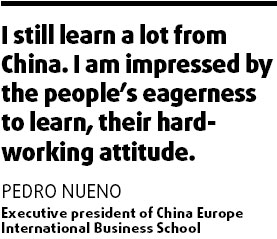Great leap forward
Sometimes a little inspiration from unexpected sources can lead to a grand accomplishment. Back in the early 1970s, when Harvard doctorate student Pedro Nueno began learning about the work of one of the school's renowned professors, Frank Folts, he never would have guessed it would lead to a long and fruitful relationship with China.
But Nueno found himself inspired by Folts' work to launch business schools in Europe, Central America and Japan after World War II. After the Spanish national received his doctorate from the Harvard Business School in 1973, he was determined to carry out his social responsibility by opening business schools around the world.
|
Courtesy of Quanjing |
Ten years later, when Nueno was executive vice-president of the European Foundation for Management Development (EFMD), he was again unexpectedly inspired by a discussion with two senior academics, who had helped bring American management practices and theories to Europe after WWII.
"At the meeting, we decided to try to bring 'European management' to China in a similar method to how the Americans brought 'American management' to Europe after the Second World War," Nueno says.
That discussion eventually lead to the establishment of the China European Management Institute (CEMI) in Beijing in 1984 - bringing China its first international standard business degree program.
Nueno found that China in the mid-1980s shared many similarities with Europe in the 1960s and 1970s.
"In the 1960s, European states also played an important role, and governments acted directly upon the economy," Nueno says, adding that many European business leaders of that time were not very different from certain Chinese business leaders today.
The Beijing program, though in high demand even in the early years of China's opening up, was eventually moved to Shanghai after Nueno and his EFMD fellows successfully landed a deal with the Shanghai Jiaotong University.
With that new agreement, the school was reopened as the China Europe International Business School (CEIBS) in 1994.
The next 13 years of the school's life operation are a totally different and successful story. Located on a beautiful 40,000-square-meter campus designed by I.M. Pei's agency, CEIBS has grown steadily during the past decade-plus, shooting into prominence as the top-ranked international business school in China.
For four consecutive years, the school's MBA program has ranked No 1 in the Asia-Pacific region by the Financial Times' annual global business school survey.
This year, its MBA program ranked 11th worldwide, while the EMBA program ranked 17th worldwide, according to Financial Times.
|
Pedro Nueno receives the Magnolia Gold Award in Shanghai's City Hall.Gao Erqiang |
Nueno, who now serves as the school's executive president, told China Daily that one secret to CEIBS' success is its demanding curriculum.
Contrary to the popular characterization of EMBA programs in China as being mainly valued for the networking and guanxi-building opportunities, Nueno says even top-level CEOs who enter CEIBS must work hard.
"It's not a networking program, and the (academic) level here is even higher than in Europe," he says.
Nueno, who also serves as the Bertran Foundation Chair for Entrepreneurial Management at the IESE Business School and as vice chancellor of the International Academy of Management, also disagreed with the charge by some Chinese entrepreneurs that business schools cannot produce entrepreneurs.
"Entrepreneurship is not genetic. No one is born an entrepreneur," says Nueno.
"Entrepreneurship can be taught. It is a process through which you start to identify opportunities, such as how to use a piece of land and how to exploit an export license."
He adds that, in Spain and some other parts of Europe, one-third of b-school graduates start a company within 10 years of leaving his school.
Nueno now flies to Shanghai at least twice a month from his home in Spain. As a founder of CEIBS and long-time chairman of the school's management committee, Nueno has been highly praised by the school's leaders and the Shanghai municipal government for his contribution.
On September 29, Nueno received the Magnolia Gold Award for good citizenship from Shanghai Mayor Han Zheng. Standing among 11 other recipients cited for making outstanding contribution to the city's social and economic development, Nueno was the only one who was not from a big corporation.
"It is a tremendous honor for me," he said, after flying to Shanghai from Europe to attend the award ceremony.
While city leaders expressed their gratitude to him, Nueno responded by thanking China.
"I still learn a lot from China," says the 63-year-old. "I am impressed by the people's eagerness to learn, their hard-working attitude."
While his knowledge of China was admittedly very limited when he began working here 20 years ago, he has come a very long way since.

"I have taught, advised, managed, brought money, attracted faculty and above all, learned a lot from colleagues in the team and from the environment, the Chinese economy and the world economy in relation with China," says Nueno.
Although he does not earn a salary from CEIBS, Nueno is clearly dedicated to carrying out his social responsibility. He also spoke fondly of receiving a writing award from the State Foreign Experts Bureau of China a decade ago.
In that article, Nueno argues that China should resist what was then mounting international pressure to make the RMB convertible. Despite the wave of global financial speculation, Nueno warned against fast changes and short-term thinking.
"I supported not to facilitate suddenly a convertibility to prevent speculation from damaging China," he says.
The ensuing Asian financial crisis proved that Nueno's advice and the strategy eventually adopted by the Chinese government, was correct.
Ten years later, Nueno is writing for China Daily again, this time advocating that Chinese companies "go global" and refuting the charge that product safety made by foreign companies in China is "a Chinese problem".
A grandfather of seven, Nueno still does not enjoy many holidays or free weekends.
"This has been my life. Up to now, I have managed, and my family has understood, because they appreciate the importance and magnitude of the (CEIBS) project," he says.
"My wife and my children have all heard me talk a lot about CEIBS, and they've visited on occasion."
(China Daily 10/16/2007 page20)
















